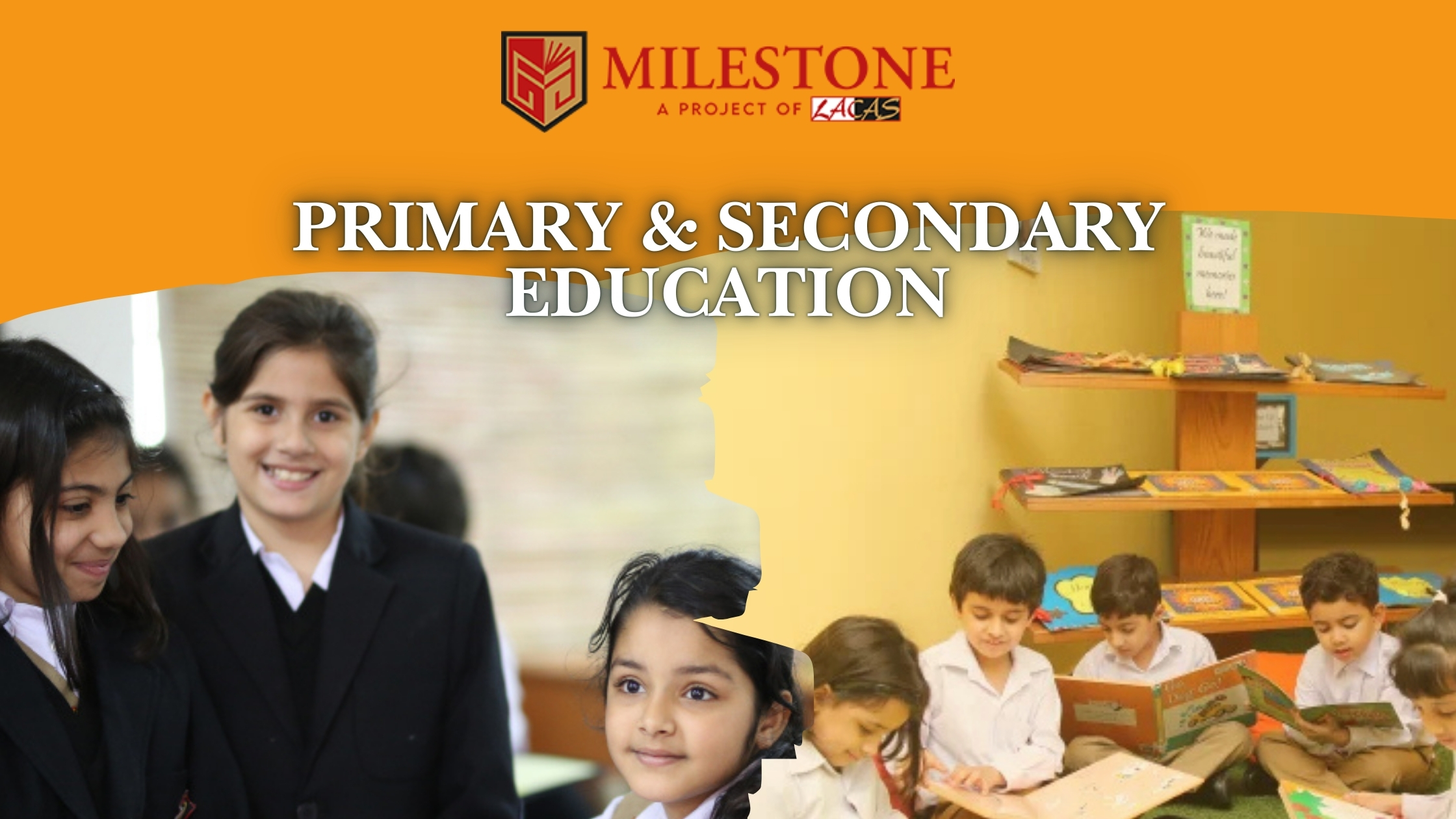In every child’s life, education is a bridge that connects curiosity to knowledge, potential to progress, and dreams to reality. In Pakistan, the educational journey from primary and secondary levels plays a vital role in shaping academic skills and life competencies.
These foundational years are about building character, confidence, and a love for learning.
But why does this transition matter so much?
Let’s explore how primary and secondary education builds the stepping stones for a brighter future and why this path is essential for every child in Pakistan.
Primary Education: The Foundation of Learning
Primary education is the cornerstone of a child’s academic journey.
It lays the groundwork for all future learning, introducing children to fundamental subjects like language, math, and science. This is where a child’s curiosity is nurtured, and a lifelong love for learning begins.
In Pakistan, primary education spans Grades 1 to 5, focusing on the basics while encouraging creativity and critical thinking. Whether it’s learning how to read and write or discovering the wonders of numbers and nature, primary school is where students first develop essential skills.
Foundation Building
Primary education serves as the stepping stone for a child’s academic journey.
It introduces essential skills like reading, writing, and arithmetic that act as the building blocks for advanced learning. Without a strong foundation, students may struggle to grasp complex concepts in secondary education.
Cognitive Development
The primary school years are a critical period for cognitive development.
During this stage, a child’s brain is at its most adaptable, making it the perfect time to enhance problem-solving, logical reasoning, and critical thinking. Activities like puzzles, math problems, and interactive learning sharpen analytical skills, fostering curiosity and creativity.
Social Skills
For most children, primary school is their first structured experience of interacting with peers and teachers. It is here that they learn to collaborate, share, and resolve conflicts in a group setting.
These interactions help children develop communication skills, empathy, and teamwork. Social development at this stage plays a vital role in preparing students for secondary school, where group projects, presentations, and peer relationships become more complex and significant for personal growth.
Character Development
Primary education is not just about academics, it is also about building character.
Schools teach values like discipline, responsibility, honesty, and perseverance through classroom routines and extracurricular activities. These qualities prepare them for the more demanding environment of secondary education, where independence and self-motivation become critical to success.
Secondary Education: The Bridge to the Future
After building a strong foundation, secondary education takes learning to the next level.
But what is secondary education in Pakistan?
In Pakistan, secondary school includes Grades 6 to 10, further divided into middle school (6-8) and matriculation (9-10). This stage focuses on academic subjects in greater detail while preparing students for future challenges, whether in higher education, technical skills, or career readiness.
Academic Development
Secondary education takes the foundational skills learned in primary school and expands them into a deeper understanding of core subjects like mathematics, sciences, languages, and social studies.
Students are encouraged to think critically, analyze information, and apply knowledge practically, setting the stage for future academic and career pursuits.
Preparation for Careers
Secondary school is where students begin to explore their interests and identify potential career paths. Whether they aim for college, technical institutes, or vocational training, secondary education equips them with the knowledge and skills needed to pursue their goals, laying a strong foundation for lifelong success.
Skill Building
In secondary education, students acquire vital life skills such as problem-solving, teamwork, leadership, and time management.
Through group projects, extracurricular activities, and academic challenges, they learn to collaborate, manage responsibilities, and make independent decisions—skills that prepare them for higher education and real-world challenges.
Shaping Identity
Secondary education plays a key role in shaping students’ identities. It helps them build confidence, define their values, and discover their passions.
By fostering self-awareness and resilience, secondary schools prepare students to navigate life’s opportunities and challenges confidently.
Why the Transition Matters: From Primary to Secondary!
The progression from primary and secondary education is not just a natural step but a vital phase in a child’s growth. Here’s why this transition is so important:
Smooth Academic Progression: The leap from simple concepts in primary school to detailed subjects in secondary school can be overwhelming without proper teaching methodologies.
Development of Lifelong Skills: This phase teaches independence and adaptability—skills that last a lifetime.
Self-Discovery: Students start recognizing their interests, passions, and career aspirations during secondary school.
Academic Success: A strong foundation in primary education ensures that students thrive in the more challenging secondary years.
How Milestone Helps Shape Students’ Futures!
The journey from primary and secondary education is transformative for every child.
It’s the foundation that builds confident learners and future leaders. In Pakistan, where education plays a pivotal role in societal growth, ensuring that students receive the right support at every step is essential.
At Milestone, we understand the importance of the journey from primary and secondary education. Our goal is to provide a learning environment where students feel supported, inspired, and confident at every step of their academic journey.
We build strong foundations through our primary program, nurturing curiosity, creativity, and essential skills. With qualified educators, innovative teaching methods, and personalized guidance, we ensure every child thrives and reaches their full potential.
Because every child deserves the opportunity to shine—today, tomorrow, and always!
Frequently Asked Questions (FAQs)
What are the differences between primary and secondary school?
Primary school focuses on foundational education, covering basic subjects like reading, writing, mathematics, and general science to develop essential skills and cognitive abilities. Secondary school, on the other hand, builds on this foundation, offering in-depth study of core subjects like mathematics, sciences, and languages.
Secondary school means which class in Pakistan?
In Pakistan, secondary school typically includes Grades 6 to 10. It is divided into two stages: middle school (Grades 6-8) and matriculation (Grades 9-10), where students prepare for their matriculation exams.



